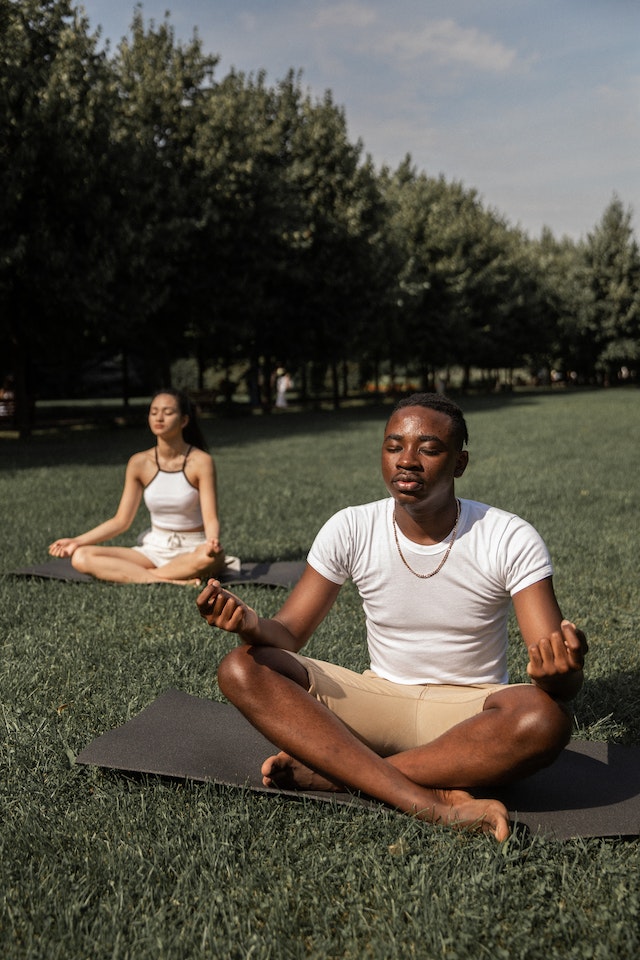How often do you hear someone talking about how they’ve taken up meditating and how much it’s changed their lives? Or how they’ve become ‘more present’ by adding mindfulness to their day-to-day lives? Sounds great, doesn’t it?
What exactly are meditation and mindfulness, and aren’t they the same? What are the benefits of meditation? What would I get out of it? What does scientific research say?
With this article, we aim to help you to understand what meditation and mindfulness are and how they can improve your well-being.
Isn’t meditation and mindfulness the same thing?

The short answer is no, they aren’t; however, they do relate to each other. Meditation can be seen as the training ground and gateway for practising mindfulness.
Meditation can be seen as a way of transforming the mind. Simply put, it is choosing to consciously focus your mind in positive and helpful ways on the here and now to cultivate a better way of being.
The practice of meditation is believed to have been around for many thousands of years. It has its origins in numerous religious traditions, including Hinduism and Buddhism. But, although it has been around for a long time, the impact and benefits of meditation have only been studied seriously from around the 1960s.
On the other hand, mindfulness is the practice of paying attention to what is happening in the present moment while acknowledging what you are experiencing, whether that be a thought, feeling or bodily sensation, without reacting or passing judgement. You develop the ability to observe what is happening around you without controlling your experience. It is the ability to be present throughout your day and life. It is a way of living.
What purpose do these practices serve?

Both methods are incredibly beneficial for your health and well-being, and each has particular advantages depending on your goal.
The purpose of meditation
The primary purpose of meditation is to strengthen your mind and use it to know yourself better, foster well-being and, ultimately, end suffering. And the benefits are numerous: for better health, to sharpen your mind, to be more aware of your body and mind, to balance your emotions, to heal psychological problems and contemplate the mysteries of life.
The purpose of mindfulness practice
Mindfulness is a technique that can help you to deal with difficult emotions and situations, feel less stress, and increase your well-being. You can reduce stress and anxiety by observing your thoughts and not responding or getting caught up in them. Being more mindful can help improve your connection with people and enhance your relationships.
What are the benefits of meditation & mindfulness?

While distinct, both meditation and mindfulness can be combined into one practice. Here are the overlap in mindfulness and meditation benefits.
1. Lowers Stress levels
Neuroimaging shows that mindfulness meditation lowers amygdala activity and strengthens its connections to the prefrontal cortex. As a result, we become less reactive to stress and recover much faster from it.
2. Relieves Negative emotions, anxiety & depression
Practicing mindfulness reduces negative ruminations, which are symptoms of depression and anxiety. Although research isn’t conclusive about meditation’s direct impact on depression and anxiety, it did ease those symptoms significantly and made it easier for people to deal with them.

Studies have also shown that meditation is somewhat effective for posttraumatic stress disorder symptoms. It can help to lower your heart rate, slow your breathing and make you feel calmer.
3. Reduces inflammation & pain
Mindfulness training reduces actual inflammation of the nervous system caused by stress, including eczema, and irritable bowel syndrome (IBS). It can also help with minimising pain symptoms (and your perception of it) to a moderate degree.
4. Lowers blood pressure
Interestingly, a review of multiple studies consistently revealed that transcendental meditation can lower your blood pressure. The benefit was quite pronounced in those with higher blood pressure levels.
MEDITATION AID LOWERS BLOOD PRESSURE
Guided Tone Therapy
With 3 mins of use, a customer with medication-resistant high blood pressure and anxiety experienced a drop of over 20 systolic and 12 diastolic points.
5. Improves focus & memory
According to a 2018 study, beginners who took part in a 10-minute guided meditation became much better at performing demanding tasks that require attention. Also, in 2015, researchers found that a form of meditation (that combined mantras and mudras) reduced the impact of Alzheimer’s disease and improved memory.
6. Increase self-awareness & confidence
Self-awareness is associated with better self-esteem, decision-making, confidence, and self-control.
It seems, a 2016 study, confirms that mindfulness meditation is connected to the trait of self-awarness. With the use of functional MRI (magnetic resonance imaging), it found that experienced meditators (i.e. average of 4,652 hours of meditation) had a more pronounced activation of self-awareness in the brain.
The bottom line
You can see that there are many benefits to meditation and mindfulness, all of which can be backed by research. Redefine your reality and get the physical and mental benefits of meditation and mindfulness practice. The only thing left for you to do is to get started.
Redefine your reality & life
Whether it’s for guided meditation or better sleep, check out our store.

